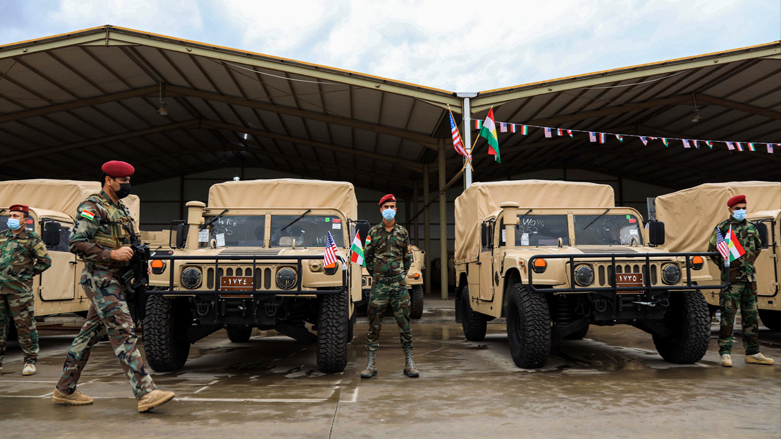US Congress passes 2022 budget with support for Peshmerga, KRG, and SDF

WASHINGTON DC, United States (Kurdistan24) — Late on Thursday, the US Senate approved the budget for the fiscal year 2022, which includes funding for the Peshmerga, other Kurdistan Regional Government (KRG) institutions, and the Kurdish-led Syrian Democratic Forces (SDF.)
President Joe Biden is expected to sign the massive expenditure bill—$1.5 trillion—later this week.
Much of the money going to the Kurds is devoted to bolstering the campaign against ISIS, waged by the Peshmerga in Iraq and by the Kurdish-led Syrian Democratic Forces (SDF) in Syria.
The bill also includes money to rebuild areas liberated from ISIS, funds for American Universities in Iraq—including the two in the Kurdistan Region, and financing for protecting ethnic and religious minorities in Iraq and Syria.
Notably, in what appears to be a jab at former President Donald Trump, the bill specifies that “none of the funds” shall be used “to exercise United States control over any oil resource of Iraq or Syria.”
To fulfill his election campaign promise, Trump announced in 2019 that he was withdrawing US forces from northeast Syria, where they had been supporting the SDF in fighting ISIS. However, that decision prompted widespread opposition, including from his own political base.
Read More: Broad opposition to Trump on Syria, including Republicans and evangelical Christians
Trump responded by reversing his position, but in a way that appeared consistent with his MAGA (Make-America-Great-Again) stance. He said that US forces would remain in northeast Syria to protect the oil fields there.
However, US forces had been deployed to the area to fight ISIS, and that remained their mission. In saying that it was about oil, Trump provided a dubious rationale for what was, by any standard, an entirely legitimate military deployment.
Details of the Budget Bill
Two items in the 2022 budget address the fight against ISIS. One is the “Counter-ISIS Train and Equip Fund,” a Defense Department program. As the bill explains, the money “continues support” for “the Iraqi Security Forces (ISF), Kurdish Peshmerga, and the Syrian Democratic Forces to participate in activities to counter [ISIS.]”
The bill authorizes $345,000 being sent to the ISF and the Peshmerga. Another $155,000 is allocated to the SDF, making for a total of $500,000.
A second appropriation comes from the “Counterterrorism Partnerships Fund,” which is also administered by the Defense Department. It encompasses “non-proliferation, anti-terrorism, demining and related programs” in “areas liberated from, under the influence of, or adversely affected by [ISIS] or other terrorist organizations.”
It includes the specific provision: “such areas shall include the Kurdistan Region of Iraq.”
Throughout 2021, the first year of the Biden administration, US officials have repeatedly affirmed their continued commitment to fighting ISIS in Iraq and Syria, despite significant speculation to the contrary, particularly in the Arab media.
Read More: US affirms commitment to fight against ISIS—and reaffirms it after erroneous reports
The 2022 budget is, indeed, a tangible reflection of the Biden administration’s continued commitment to fight ISIS in its homeland, Iraq and Syria.
The budget also includes money from the State Department’s Economic Support Fund for “assistance for ethnic and religious minorities in Iraq and Syria.”
Tolerance towards religious and ethnic minorities is actively promoted by the Kurdistan Regional Government and is a position that has long been praised by senior US officials.
Read More: Kurdistan Region commemorates International Religious Freedom Day
In addition, the bill provides $10 million to support American Universities in Iraq, of which there are three. Two are in the Kurdistan Region, in Duhok and Sulaimani, while the third is in Baghdad.
The funding for the Peshmerga and the KRG, and the bill’s repeated statements that monies are allocated to the Kurdistan Region as well as Iraq, reflect the strong bipartisan support for the Kurds in Congress.
Congress sees Kurds as a reliable partner and ally in the work of confronting shared national security challenges in the region. To that effect, and given the heightened level of threats facing both parties, Congress has increased the level of funding for the Kurdistan Region in the 2022 budget.
This also reflects the work of the KRG mission in Washington. The KRG mission has kept US legislators well-informed of the Kurdish contribution to issues of significant concern, and about the needs and aspirations of the people of the Kurdistan Region.
